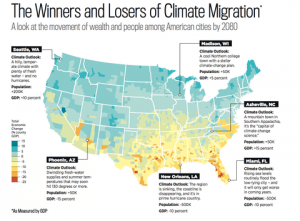In a much simpler context, whenever consumerism is able to actively embrace and integrate its most earnest desires within the ‘go green’ phenomena, profound results will follow. Two examples:
Last year about this time, a very good friend in France hit a big birthday and I went over for a week to drink great champagne and deliver a present. This was an incredible hassle, as the present was a painting his wife bought from another friend over here; I built a plywood box around it, tacked on a handle and checked it at the airport. When I spotted it safe and sound at the luggage carousel at de Gaulle the next morning, my odyssey with this box had only begun. Customs officials, the Paris Metro, all sorts of stairs, taxis, a friend’s place, hotels… but there were all kinds of wonderful elements to a few days in the city, including my discovery of an arrondissement I’d never visited ( the XIXeme), this crazy David Lynch art show at the fondation Cartier, plus a stroll out to La Defense one evening – one evening when there happened to be small riot between some kids and the police at the Gare du Nord (this was about two weeks before Sarkozy’s election. If you want to see the underside of any country, visit it right before a national election.)
So, by mid-week I had dragged the box halfway around the city, all the way to the Gare du Lyon, where I waited with it for the TGV to take us both down to Valence. The recorded SNCF lady’s voice, reminding passengers of track changes and other crucial information, was so pleasant reverberating in that old station. It makes you look up at the somewhat ornate ceiling and forget for a minute about the non-existent place you might be able to stow an oddly shaped box somewhere in the second class compartment. There was a billboard that caught my eye, high above the din of arrivals and departures. Nothing high tech, just a static, color sign, an advertisement for some new Peugeot or something. As the SNCF lady was speaking, I noticed the copy on the billboard. They weren’t advertising its engine size, or on-board nav system, or even the fuel efficiency. The ad copy, streaming outside a glamorous profile shot of the sedan gliding across a wide landscape, merely and with a sort of halting understatement noted the vehicle’s amount of carbon emissions per kilometer. BAM. I was right back in the future.
There was a lot politics in discussions with my friend, his wife and their friends during the rest of my stay, most of it very depressing to me as an avowed admirer of most choses francaises. Their cynicism was very well-informed and convincing, and I could but go along and commiserate on most issues. But I kept holding onto that sign in the Gare du Lyon. Like most symbols, it stood for more than itself, particularly in a milieu that seemed like it was sliding back toward its own worst impulses. It was a small reminder that all was not lost; that company’s ad people had some pretty amazing confidence in the car buying public, and if they had it, then…
The other example, from the same trip. Near the end of the week, my friend and I went to grocery store so I could buy some of my wife’s favorite items to smuggle back: some wine, chocolate, jars of mustard, a little foie gras and tin of this delicious peasant food that we love. Anyway, we got all that plus a few more things and headed for the checkout. I paid with my debit card and went around to the end of the checkout counter to bag my buys. Now this was a huge grocery chain, like Le Clerc or Intermarche or something. But when I went around to the end of the counter and reached for some bags, a funny thing happened: there weren’t any.
I was honestly shocked. They were no longer providing free plastic shopping bags for customers, for every reason everyone already knows. But someone had made the decision, and some company had made it policy. No more, sorry. Perhaps it had been mandated by the government or they had started charging people some inordinate amount to use, make or dispose of them. Whatever it was, it worked. They were gone. My friend looked at me and apologized with sudden alarm that he had left his bags in the car, where they always now were. This little array of habits was splayed out embarrassingly for me, a sort of gratuitous display of acting sensibly that put most other actions in a very poor light. It made me wonder as we grabbed our stuff in our arms and darted out into the waiting drizzle, why do we still live this way, hemmed in so many sides by the little conveniences we demand?
It’s just a little thing, bringing bags to the grocery store or buying a car for its low emissions. But they are both on their way. You don’t have to feel especially empowered – or as though your liberty has been infringed upon – by doing the right thing, but you can.
related.

